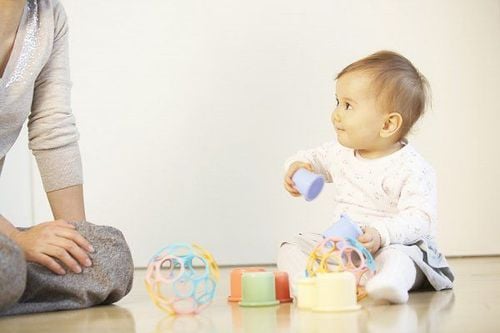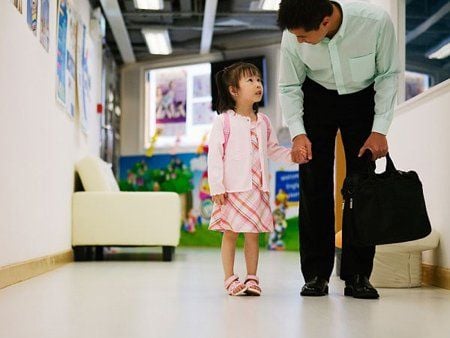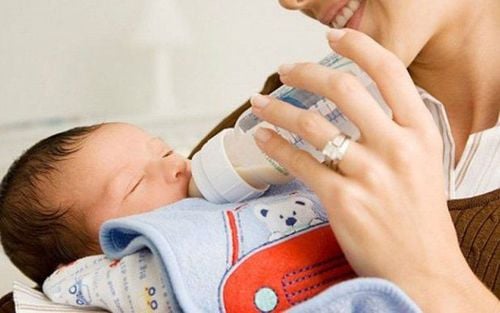This is an automatically translated article.
A good relationship between parents and children is a core value that sets the stage for a happy family life. Therefore, parents need to take care of their children from a young age.1. Pregnancy stage: Falling in love at first sight
Pregnancy is a time when a woman's body produces many hormones. They form the basis for the connection between parents and children.During pregnancy, a woman's body continuously secretes hormones, the level of which increases over time. Towards your due date, oxytocin is secreted in abundance to provide sensation, thereby creating maternal behaviors in you. Oxytocin also helps reduce stress for pregnant women during childbirth.
Animal studies show that oxytocin has a major impact on all kinds of social behaviors, from parenting to forming lasting relationships. Animals that lack oxytocin receptors in important brain centers will often abandon their offspring and find different mates with each breeding season. Meanwhile, animals with more oxytocin receptors tend to have long-term attachment to mates. So, when oxytocin levels rise in a mother's body, it means her love for her baby is stronger than ever.
Even in the womb, the fetus has formed a bond with you. Your heartbeat sounds so soothing to your baby. The flavors in the foods you eat will affect the taste of the amniotic fluid that surrounds your baby. And your baby's heart beats a little faster when he hears your voice.
If you're a father expecting a baby, you won't have the same hormonal surge and physical closeness to your growing baby as moms do. But don't worry, your relationship with your child will not be affected.
Newborns and older children have the ability to form good relationships with anyone who meets their physical and emotional needs. And people never reach their full potential and desire in forming these connections. Therefore, whoever it is, if you try to practice connecting with your child, you can become a lifelong attachment.

Ngay từ trong bụng mẹ, thai nhi cũng đã hình thành mối liên kết với bạn
2. Acceleration of love between parents and babies
During labor, oxytocin is released in large quantities. This body response is intended to induce contractions and make breast milk flow. Hormones also help ease the pain of labor to bring a feeling of refreshment, intense love after the baby is born, and minimize exhaustion.Some fathers also release oxytocin when they see their baby for the first time. This unexpected emotion sometimes overwhelms fathers in the delivery room. According to the results of some studies, men's testosterone levels plummet by 26-34% when they become fathers. This drop appears to be a biological adjustment that helps men shift their priorities when it comes to having children. Some men begin to produce extra estrogen, which is perhaps the clearest sign of the transformative power of fatherhood. Estrogen makes the brain more sensitive to oxytocin, which can help fathers become more loving and caring.
Oxytocin isn't the only "love chemical". Dopamine also plays an important role in forging the initial bond between parent and child. This chemical is most often felt when you hold, rock, or breastfeed. The results of the study in rats that the pups that did not receive dopamine did not particularly care whether their mothers were nearby, suggesting a role for dopamine in mother-child emotional bonding.

Hormone oxytoxin giúp làm dịu cơn đau khi chuyển dạ để mang lại cảm giác sảng khoái, yêu đời mãnh liệt sau khi đứa bé được sinh ra
3. Love is interrupted if the parents do not bond with the infant immediately
About 30% of mothers do not fall in love with their baby immediately, often due to the child's reasons or the birth process not as expected of the mother. Feelings of frustration, stress, or exhaustion are enough to overwhelm the intense stimuli of love. However, this feeling quickly wears off, and most parents become attached to their baby in the first few months.If for some compelling reason you can't be with your child, don't despair. In some special circumstances, such as the occurrence of postpartum complications, parents cannot stay with their children for long while the newborn still has a lot of time, said neuroscientist of the US National Science Foundation - Witt. later time to cultivate love”.
However, if the baby is born prematurely and has to stay in the incubator for a few days or weeks, try to spend as much time with the baby as possible, as soon as possible, for the benefit of the family and the baby. Recent studies show that skin-to-skin therapy has a positive effect on a child's recovery.
A father's touch can be as gentle as a mother's. A study of premature infants requiring intensive care showed that parental attention can have a positive effect. Babies who were visited regularly by their fathers gained weight rapidly and had better emotional development 18 months later, possibly because the children continued to receive parental care after returning home.
Likewise, if the mother has a cesarean section and cannot hold the baby right away, ask the father to take care of the baby. A 2007 study of babies born by caesarean section found that skin-to-skin time with their fathers reduced fussiness and encouraged babies to form their first naps after birth.
Your love for your child will grow over time. Connections are then formed and developed: The child looks you straight in the eye and tries to remember your face, he smiles at you. In a study published in the journal Pediatrics in 2008, it was found that when mothers looked at pictures of their babies smiling, their brains increased activity in areas associated with dopamine, the connection substance. fun.
When babies are 7 months old or 8 months old, babies develop emotional attachment to family members. Babies will be especially interested in those who hold them when they cry and feed them when they are hungry. Your baby misses you when you leave the room and is happy when you come back.
Note: The family should not spoil the baby with love and care. When you are too young, you are building a strong foundation and that affection will last a lifetime.

Khi được 7 tháng tuổi hoặc 8 tháng tuổi, bé mới phát triển tình cảm gắn bó với các thành viên trong gia đình
4. Emotional connection between parents and toddlers
The parent-child relationship will develop as the child enters the toddler stage. Although during this time, children spend a lot of time learning to walk and scream. Yelling or hitting is just a child's way of expressing anger towards loved ones, not a sign that he doesn't love you.Moments of disappointment when your baby still can't walk is only a sign that the toddler stage has created many challenges for families, not a sign that you will stop loving your child. This has been proven through research by British scientists when they took MRI brains of 20 mothers who were reviewing pictures of their babies. The results showed that the part of the brain that controls feelings of euphoria lit up.
At this stage, children show affection to their parents by running to their side when they are injured or need to be comforted. "Children want help from those they trust most," says psychologist Braungart-Rieker.
5. Promote parental love for preschool and older children
As kids get older, they'll start to hide their emotions more, partly because of peer pressure, and partly because of your tired reaction to your child's obvious displays of emotion at home. walking phase.Even though love is not expressed in obvious actions, there are many opportunities for parents and children to connect with each other. It is through the children's confidants, when they need you as a confidant, for advice and mental reassurance.
In addition, when parents perform actions such as sending their children to school or watching their children play at school, children also feel love. Or actions like kissing your child on the forehead, helping her with her homework can also help build a lasting bond.
When children grow up, it is also time to start learning to live independently. This is a time when family love and support is needed more than ever. "It may seem counterintuitive, but the more secure parents create in their children, the more likely children are to live independently," says Northwestern University psychologist Adam.
Even when children are on the path to forming their own personality, family is still a solid fulcrum. This relationship has been and is being built over a long period of time, but in retrospect, both feel cherished and loved for each other.

Khi bố mẹ thực hiện các hành động như đưa con đi học hoặc xem con chơi ở trường, trẻ cũng cảm nhận được tình yêu thương
Gathering a team of leading pediatricians: including leading experts with high professional qualifications (professors, associate professors, doctors, Master's degree), experienced, worked at major hospitals such as Bach Mai, 108.. The doctors are all well-trained, professional, conscientious, knowledgeable about young psychology. In addition to domestic pediatric specialists, the Department of Pediatrics also has the participation of foreign experts (Japan, Singapore, Australia, USA) who are always pioneers in applying the latest and most effective treatment regimens. . Comprehensive services: In the field of Pediatrics, Vinmec provides a series of continuous medical examination and treatment services from Newborn to Pediatric and Vaccine,... according to international standards to help parents take care of their baby's health from birth to childhood. Advanced techniques: Vinmec has successfully deployed many specialized techniques to make the treatment of difficult diseases in Pediatrics more effective: neurosurgery - skull surgery, stem cell transplantation blood in cancer treatment. Professional care: In addition to understanding children's psychology, Vinmec also pays special attention to the children's play space, helping them to play comfortably and get used to the hospital's environment, cooperate in treatment, improve the efficiency of medical treatment.
Please dial HOTLINE for more information or register for an appointment HERE. Download MyVinmec app to make appointments faster and to manage your bookings easily.
Reference source: babycenter.comSEE MORE
Newborn care until full month Care of babies in the perinatal period (first 7 days after birth) A complete guide to newborn care













